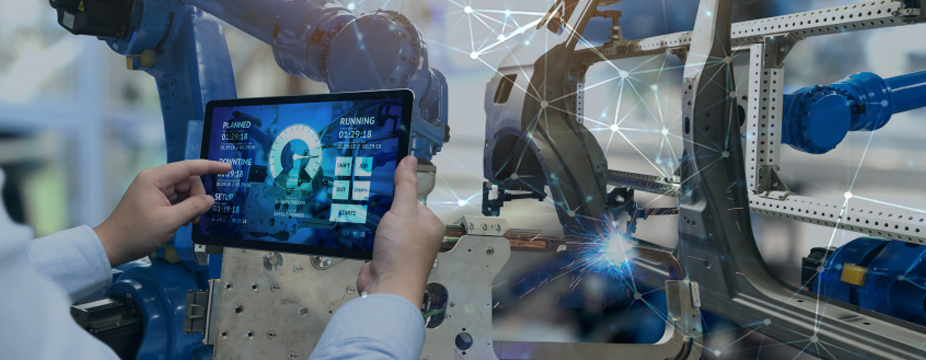Artificial Intelligence (AI) In Scaling Automotive Technology
Scaling automotive technology and integrating it with AI is making human fantasy possible. Building super machines to surpass the future vision became a prior aim for smart businesses in the automotive outline.
Automation and digital transformation aren’t new to the automotive industry. From building driverless, electric cars to embedding autonomous robots at the factory floor, the automotive industry has come a long way to drive potential income out of it. As industry giants in this sector are cracking codes to breakdown future needs while small players are struggling to scale their existing systems. Integrating AI to scale automotive technology will provide a chance to occupy the shares in the mainstream automobile market. Here are top tips about using AI in scaling automotive technology to seize the opportunities that it own.
AI in the Automotive industry – Opportunities
According to Statistica reports, organizations accepting and deploying AI systems at its core have grown to 10% from 7% in the last three years. AI has the potential to automate every operation in the automotive industry but here are top areas where AI is used to scale the existing systems.
-
Research and development (R&D)
Automakers spend more than $100 billion globally every year on R&D and apart from huge investments, it costs their quality time too. In the last five years with evolving technologies, the time and cost spent on R&D are cutting down. AI integrated predictive models are helping automotive manufacturers to predict outcomes using simulation to reduce the cost spent on component tracking and track testing.
-
Manufacturing
Smart manufacturing at aid provides advantageous benefits through visual inspection and predictive maintenance models. AI integrated intelligent systems monitor the manufacturing process through augmented or virtual systems that help automakers in identifying faulty or sub-standard products. And predictive maintenance models help in identifying and resolving issues related to machine breakdowns in advance.
Here is how AI is scaling automotive manufacturing:
Previously if a business had manufacturing plants at multiple locations, the business needs to develop and test the product at one location after the prototype is shipped to build the manufactured units of it. AI integrated intelligent systems can predict the success rate of any developing project and help in manufacturing the same product at different workstations based on the digital blueprint or hologram of the product communicated.
-
Marketing and sales
AI predicts and provides insights on how to market or sell a product to the new or existing customer. By predicting insights from the customer’s historical & digital data, AI systems inform either to pitch new-innovative products or offer an add-on service or additional parts for the existing vehicles.
-
Inventory and logistics management
As automotive manufacturing involves huge production costs, manufacturing excess vehicles or counterparts could cost higher margins. Predictive analytical models with intelligent systems help in tracking and tracing market information and the supply required ahead in time for maintaining optimal inventory value. Visual product inspection helps in separating qualified quality products from faulty or defective products or parts in the logistics cycle.
-
Customer or driver experience
Innovation and integration of intelligent systems are aiming at providing a seamless driving experience for the customer. As driverless vehicles are at developing stages of research, the industry is also constantly upgrading at its own to manufacture optimized vehicles for providing next-level drive experience. Smart technologies and intelligent systems are modifying the traditional functioning of a vehicle in object identification and avoidance systems, smart sensors to detect technical or medical emergencies in a vehicle, driver assistance systems, etc.
-
Advanced infotainment systems
Intelligent infotainment systems in a vehicle are acting as a virtual assistant less close to robotics and more close to human intelligence. These systems can assist in judging real-time vehicle performance, predicting vehicle maintenance breakdown at distinct periods, real-time demographical assistance through geospatial communications, etc. And it also secures information from cyber threats through proactive prediction and maintenance.
How can AI help in scaling automotive manufacturers effectively?
Capgemini conducted research to understand the factors implemented by automotive manufacturers while scaling AI at their business level. According to their research, most of the organizations which had succeeded at scaling AI followed these basic rules at their core.
– Highly focusing and implementing high-end use cases, which are found to have above-average benefit value at their function.
– Inaugurating and embedding strong AI governance as a base of business.
– Hiring AI expertise and upgrading their skills at distinct periods.
– Huge capital investments
– Scaling IT and data science practices.
The automotive industry has made moderate progress in the adoption of AI technologies. The integration of intelligent systems has progressed the work time spent on designing, building, and testing a prototype product. The growth towards embedding AI systems into the automotive ecosystem is increasing, and businesses thinking about its implementation should take a chance with AI if they are seeking potential growth in the upcoming years. The hype of the technology is at a swing and the future of the automotive is driven by AI.
